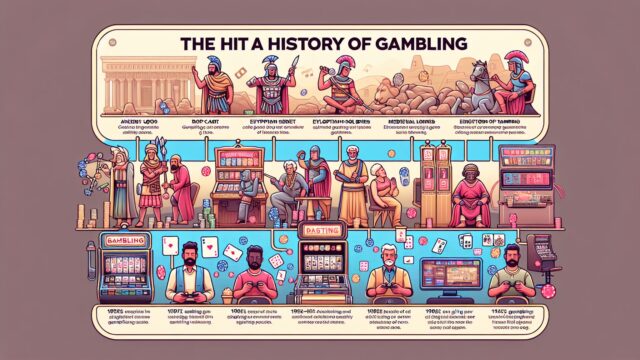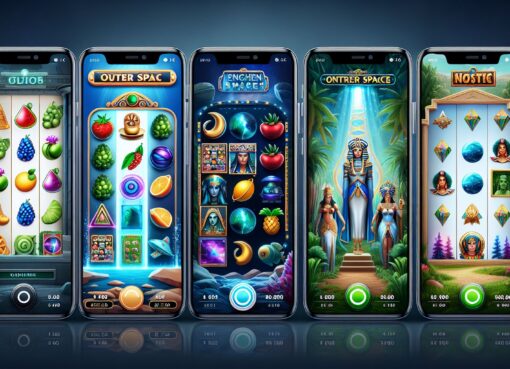#The History of Gambling: From Ancient Times to the Digital Age

Gambling is a popular pastime that has been around for centuries. From the ancient civilizations of Egypt, China, and India to the modern world of online casinos and sports betting, gambling has always been ingrained in human society. In this blog post, we will take a journey through the history of gambling, tracing its origins, evolution, and impact on different cultures around the world.
Origins of Gambling
The origin of gambling can be traced back to ancient civilizations, with evidence of games of chance found in the ruins of Pompeii and ancient China. However, the first known form of organized gambling can be found in ancient Greece, where the game of dice was played for entertainment and to determine the fate of characters in their epic poems. Over time, gambling spread to other civilizations, including the Romans, who were known for their love of dice and betting on chariot races.
One of the first recorded instances of gambling being used for monetary gain was during the reign of Emperor Claudius, who had to raise funds for the city of Rome. He did this by holding public lotteries, which were a form of gambling where people would place bets on numbers in hopes of winning a prize.
Gambling in the Middle Ages
During the Middle Ages, gambling was often viewed with suspicion and considered a sin by the Church. However, this did not stop people from playing games of chance in secret, and gambling even became popular among the upper classes. The game of chess, which was considered a game of skill, was transformed into a game of chance by introducing dice and betting on the outcome. This was done to circumvent the Church’s disapproval of gambling.
As the game of chess gained popularity, it was often used as a means of gambling among the kings and nobles of Europe. It was also during this time that the first playing cards were introduced, which established the foundation for modern card games. These cards were hand-painted and were a luxury only afforded by the wealthy.
Gambling in the New World
Gambling continued to evolve and spread as explorers and colonists brought games with them to the New World. During this time, lotteries were used to fund public works, such as the construction of roads, bridges, and churches. However, with the growth of gambling, concerns over addiction, crime, and corruption began to surface.
As a result, many colonies banned games of chance, and gambling was only allowed to take place at fairs and festivals. In the late 1700s, the lottery game called “Policy” was introduced in the United States. This game involved betting on three digit numbers, and it quickly spread to all major cities. However, as this game became more popular, states began to see it as a threat to their lotteries and eventually banned it.
The Rise of Casinos
By the early 19th century, gambling became widely accepted in the United States. In the west, the California Gold Rush brought an influx of people who were eager to gamble their newfound wealth. This led to the rise of saloons, where gamblers could play a variety of games, such as poker and blackjack.
In 1931, gambling took a major leap with the legalization of casinos and Nevada becoming the first state to allow this type of gambling. This led to the development of Las Vegas, which became known as the gambling capital of the world. Along with casinos, organized crime also flourished, as they saw gambling as an opportunity to make a lot of money through illegal activities.
The Introduction of Online Gambling
The 20th century saw a boom in technology, and gambling was not left behind. With the rise of the internet, online gambling became a reality, and it quickly grew in popularity. In 1994, the first online casino was launched, and by the late 1990s, there were hundreds of online casinos operating worldwide.
The convenience and accessibility of online gambling have made it a preferred choice for many people. Players can now access a wide variety of casino games, including virtual versions of traditional games like poker, blackjack, and slots, from anywhere at any time. The rise of online gambling has also led to the development of virtual sports betting, which allows players to place bets on live sporting events without having to physically attend the game.
Gambling in the Digital Age
In recent years, the gambling industry has seen significant growth due to technological advancements. One of the biggest changes has been the rise of mobile gambling, which allows players to access casino games and sports betting from their smartphones and tablets. This has made gambling more convenient and accessible than ever before.
Another major change is the introduction of virtual reality (VR) and augmented reality (AR) in the gambling world. VR technology allows players to experience a fully immersive casino experience from the comfort of their own homes. AR also adds to the gaming experience by overlaying graphics and animations on the player’s real-world environment, making it feel as if they are in a physical casino.
Conclusion
From ancient civilizations to the digital age, gambling has remained a popular form of entertainment that has evolved in many different forms. While it has faced opposition and legal challenges throughout history, gambling has been a significant part of human society and continues to have a major impact today. As technology advances, the gambling industry will undoubtedly continue to evolve and adapt to the changing times, providing players with new and exciting ways to play.



